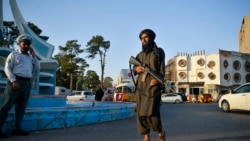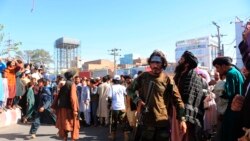For weeks since the Taliban seized power in Afghanistan in mid-August, many Afghans had been wondering if the militants would resume meting out public punishments of the sort that made them notorious during their first rule in the 1990s.
On Saturday, they got an answer.
In the western Afghan city of Herat, Taliban forces hanged the bullet-ridden bodies of four alleged kidnappers in four different corners of the city. One body was filmed hanging from a construction crane in downtown Herat, where a large crowd of curious onlookers converged around the area.
"They were hanging from the cranes from late afternoon to early evening," a local resident, who asked not to be identified out of fear of retribution, told VOA. "Everyone who passed by could see them."
Taliban officials told local media the four had been killed in a gun battle after allegedly abducting a local businessman and his son earlier in the day. Their bodies were hanged as a "lesson" to other would-be criminals, the media reports said.
In a city once plagued by kidnappings, many felt the alleged criminals received their just deserts.
"The best punishment for kidnappers!" wrote one Facebook user posting from Herat.
Others condemned what they saw as a barbaric act.
"Which court declared that they were kidnappers, and under what laws were their bodies publicly hanged?" another Facebook user wrote in reaction to the news.
To human rights activists, this was the latest sign that the Taliban, their public pronouncements notwithstanding, have hardly embraced a more moderate style of governance.
"What we're already seeing are signs that despite efforts to pretty up the ugly reality, Taliban 2.0 has many of the same deeply disturbing practices as Taliban 1.0," Kenneth Roth, executive director of Human Rights Watch, said during an online panel discussion Monday moderated by the International Commission of Jurists.
Human Rights Watch has been documenting human rights abuses by the Taliban since the group's takeover of Afghanistan, and "what we've found is deeply disturbing," Roth said. He cited summary executions, forced disappearances and arbitrary detentions of former government officials and security personnel.
Roth joined other rights advocates in calling on the U.N. Human Rights Council to establish a new body to investigate Taliban abuses and to hold them accountable.
The Taliban have dismissed the allegations.
The scene Saturday in Herat was redolent of the Taliban's first time in power, from 1996 to 2001, when their swift and summary punishment of all manner of offenders gained them global notoriety.
Convicted murderers and adulterers were executed. Thieves had their hands amputated. On some Fridays, thousands used to swarm into Kabul's main sports stadium to witness the punishments. The punitive methods were widely condemned, cementing the Taliban's status as an international pariah.
Eager now to avoid international isolation, Taliban leaders have sought to project a softer face, pledging to respect human rights, including the rights of women and girls, though within their version of Islamic law.
With Afghan girls barred from attending secondary school and many women unable to work, doubts have grown over those commitments.
One of the group's founders said last week that executions and amputations will be back, though perhaps not in public.
"Cutting off of hands is very necessary for security," Mullah Nooruddin Turabi, who headed the Taliban's religious police in the late 1990s, said in an interview with The Associated Press.
Turabi said the recently formed Taliban governing Cabinet was studying whether to carry out punishments in public and would "develop a policy."
Repeating a Taliban talking point, Turabi said, "We are changed from the past."
Amnesty International said that in the span of just a few weeks, it has documented what it calls "a litany of human rights abuses" by the Taliban, from the targeted killings of former government employees and security personnel to restrictions on women, freedom of expression and civil society.
The Taliban have restored another punishment method from the 1990s — parading men accused of theft around Kabul and Herat with nooses around their necks.
With the regime in its infancy, it's unclear how many such incidences have taken place at the behest of the Taliban leadership. In a message to Taliban fighters last week, the group's defense minister, Mullah Mohammad Yaqoob, acknowledged that there had been abuses, including unauthorized executions, but warned that such actions would not be tolerated.
Some rights advocates fear it will get worse.
"We know how bad, how very bad it will get, and we know already it is pretty awful," said Agnes Callamard, secretary general of Amnesty International.
Shaharzad Akbar, chairperson of the Afghanistan Independent Human Rights Commission, believes that the Taliban said punishments are carried out without due process.
"It's in this environment of ongoing violations," Akbar said during the online panel Monday. "There is also the fact that the laws and delivery of justice (have) been suspended."
Lawyers, judges and prosecutors are mostly in hiding, she said. At least one detainee was recently killed in detention in the eastern province of Kunar, according to Akbar.
"They're creating an environment of fear for everyone," Akbar said, "including, of course, human rights defenders, women's rights activists and journalists that are still in the country."







